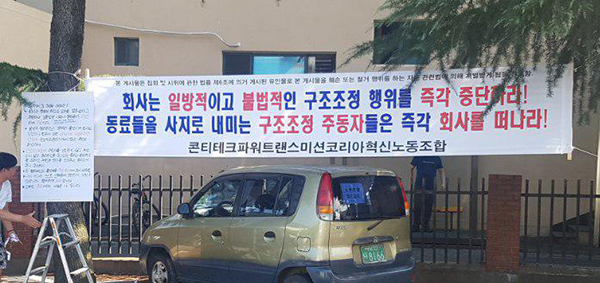
A Korean subsidiary of Continental AG, a leading German automotive parts manufacturing company is caught up in a controversy, because the company has downsized its workforce by about 30 percent, even though its financial structure is known stronger than that of Samsung Electronics. The company allegedly manipulated the management crisis by calculating several hundreds of millions of won(several hundreds of thousands of US dollars) of fines and legal fees as the corporate loss. The company entered into the downsizing, soon after it had appealed to the employees to work harder with rhetoric of "unprecedented high productivity" or "anticipated successful business performance".
According to the industry circle and the dismissed concerned on October 31, the South Gyeongsang Regional Labor Relations Commission recently issued a remedy order to ContiTech Power Transmission Korea to reinstate two dismissed employees only surnamed Kwon(51 years old) and Kang(49 years old) who filed an application for a remedy of unfair dismissals against the company with the Labor Relations Commission.
ContiTech Power Transmission Korea located in Yangsan, South Gyeongsang Province near the city of Busan supplies the automotive manufacturing companies with conveyor belts. In 2005, Continental AG took over Hangchang Chemical, a local company with the merger and acquisition. As of December last year, the number of employees was about 170, but the number has been reduced to about 120 now.
Downsizing has started from May this year. On May 24, the ContiTech Power Transmission Korea Labor Union exclusively consisting of production workers received a notice of downsizing plan, citing "anticipated future deficits". The company and labor union agreed a downsizing plan only targeting the employees in the office in the labor management consultation council held two months after the notice. Of 41 office employees, 8 employees were selected as the "redundant workforce due to the corporate merger and acquisition." 6 employees quit their jobs as urged to resign by the company.
The company met with Kwon and urged him to tender the resignation. When he refused the company's demand, he was banned from entering the company and ordered to "stay home until August 13." Kwon along with Kang who was also included on the downsizing list formed another labor union on July 23 and applied for a labor union registration as the ContiTech Power Transmission Korea Innovation Labor Union. At around 11 pm at night of the very next day of the application of a labor union registration, Kwon received a dismissal notice in a text message sent by the company.
The next target for the downsizing was production workers. In late July, the company made another list of 35 production workers arbitrarily arranged by the "selection criteria for the layoffs of production workers." 34 production workers quit their jobs as urged by the company. Kwon insisted that "When an employee refused the urged resignation, the company dismissed the employee, even without urgent managerial needs regulated by the Labor Standards Act."
The company takes a position that the layoff is fairly carried out. According to the company, ContiTech Power Transmission Korea recorded a net loss of 337 million won(US$296,000) in 2016 and 815 million won(US$715,000) in 2017 respectively. The company explained that "In 2016, the business performance went into the red abruptly and the volume of orders kept on shrinking rapidly ever since, we have been confronted with a situation that if no measures taken, the company will be destined to shut down," adding that "It was an inevitable choice of layoffs to retain the majority of employees at the sacrifice of some employees and it well meets the requirement of the managerial reasons."
However, it is hard to understand the company's explanation if the details of the net loss are closely examined. ContiTech Power Transmission Korea paid a total of 400 million won(US$325,000) as severance pay to 4 executives including chief executive leaving the company in 2016. The company also spent 500 million won(US$440,000) of legal fees involved in a price-fixing allegation case investigated by the Fair Trade Commission(FTC) and 1.4 billion won(US$1.23 million) in 2017 as a fine, following the ruling of the price-fixing by the FTC.
The debt to equity ratio of ContiTech Power Transmission Korea in 2017 was 18.6 percent, much lower than the national average debt ratio of 79.8 percent for the manufacturing companies, and even better than the debt ratio of Samsung Electronics(39 percent) as of the third quarter of this year.
reported by Yang Ou-ram
translated by Kim Sung-jin

